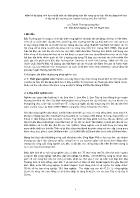 Kiểm kê đa dạng sinh học và đề xuất các biện pháp bảo tồn vùng dự án bảo tồn đa dạng sinh học ở dãy núi bắc Trường Sơn (huyện Hương Sơn, tỉnh Hà Tĩnh)
Kiểm kê đa dạng sinh học và đề xuất các biện pháp bảo tồn vùng dự án bảo tồn đa dạng sinh học ở dãy núi bắc Trường Sơn (huyện Hương Sơn, tỉnh Hà Tĩnh)Bắc Trường Sơn là ñiểm nóng về ña dạng sinh học và bảo tồn. Nghiên cứu ñược tiến hành trong khuôn khổ Dự án bảo tồn ða dạng sinh học ờ dãy núi Bắc Trường Sơn, Hà Tĩnh trên ñịa bàn 4 xã phía tây huyện Hương Sơn gồm Sơn Kim 1, Sơn Kim 2, Sơn Tây và Sơn Hồng. Khảo sát thực ñịa ñược thực hiện từ 8/2003 ñến 6/2004 theo phương pháp khảo sát tuyến. ðã ...
 12 trang | Chia sẻ: nguyenlam99 | Ngày: 11/01/2019 | Lượt xem: 1464 | Lượt tải: 0
12 trang | Chia sẻ: nguyenlam99 | Ngày: 11/01/2019 | Lượt xem: 1464 | Lượt tải: 0 Sinh học - Bộ nhớ con người
Sinh học - Bộ nhớ con ngườiLàm một cách máy móc tự động Không tính toán, tư duy mà vẫn làm được Phản xạ tự nhiên có điều kiện Kết quả cao hơn hẳn người bình thường Rèn luyện ngày ngày quyết liệt
 16 trang | Chia sẻ: nguyenlam99 | Ngày: 11/01/2019 | Lượt xem: 1185 | Lượt tải: 0
16 trang | Chia sẻ: nguyenlam99 | Ngày: 11/01/2019 | Lượt xem: 1185 | Lượt tải: 0 Bài giảng sinh học động vật – dh14cn - Sinh học động vật nuôi
Bài giảng sinh học động vật – dh14cn - Sinh học động vật nuôiMô kinh tế 3 loại mô: xương, cơ và béo Chịu ảnh hưởng: giống, giới tính, quản lý Độ thành thục và giới tính đánh giá kinh tế
 26 trang | Chia sẻ: nguyenlam99 | Ngày: 11/01/2019 | Lượt xem: 1063 | Lượt tải: 0
26 trang | Chia sẻ: nguyenlam99 | Ngày: 11/01/2019 | Lượt xem: 1063 | Lượt tải: 0 Sinh học - Chapter 56: Conservation biology and restoration ecology
Sinh học - Chapter 56: Conservation biology and restoration ecologyDescribe the conflicting demands that may accompany species conservation Define biodiversity hot spots and explain why they are important Define zoned reserves and explain why they are important Explain the importance of bioremediation and biological augmentation of ecosystem processes in restoration efforts
 114 trang | Chia sẻ: nguyenlam99 | Ngày: 11/01/2019 | Lượt xem: 1126 | Lượt tải: 0
114 trang | Chia sẻ: nguyenlam99 | Ngày: 11/01/2019 | Lượt xem: 1126 | Lượt tải: 0 Sinh học - Chapter 55: Ecosystems
Sinh học - Chapter 55: EcosystemsDistinguish between the following pairs of terms: primary and secondary production, production efficiency and trophic efficiency Explain why worldwide agriculture could feed more people if all humans consumed only plant material Describe the four nutrient reservoirs and the processes that transfer the elements between reservoirs
 107 trang | Chia sẻ: nguyenlam99 | Ngày: 11/01/2019 | Lượt xem: 1051 | Lượt tải: 0
107 trang | Chia sẻ: nguyenlam99 | Ngày: 11/01/2019 | Lượt xem: 1051 | Lượt tải: 0 Sinh học - Chapter 54: Community ecology
Sinh học - Chapter 54: Community ecologyDefine an ecological niche and explain the competitive exclusion principle in terms of the niche concept Explain how dominant and keystone species exert strong control on community structure Distinguish between bottom-up and top-down community organization Describe and explain the intermediate disturbance hypothesis
 126 trang | Chia sẻ: nguyenlam99 | Ngày: 11/01/2019 | Lượt xem: 1153 | Lượt tải: 0
126 trang | Chia sẻ: nguyenlam99 | Ngày: 11/01/2019 | Lượt xem: 1153 | Lượt tải: 0 Sinh học - Chapter 53: Population ecology
Sinh học - Chapter 53: Population ecologyExplain how limited resources and trade-offs may affect life histories Compare the exponential and logistic models of population growth Explain how density-dependent and density-independent factors may affect population growth Explain how biotic and abiotic factors may work together to control a population’s growth
 118 trang | Chia sẻ: nguyenlam99 | Ngày: 11/01/2019 | Lượt xem: 1187 | Lượt tải: 0
118 trang | Chia sẻ: nguyenlam99 | Ngày: 11/01/2019 | Lượt xem: 1187 | Lượt tải: 0 Sinh học - Chapter 52: An introduction to ecology and the biosphere
Sinh học - Chapter 52: An introduction to ecology and the biosphereExplain how a body of water or mountain range might affect regional climatic conditions. Define the following terms: photic zone, aphotic zone, benthic zone, abyssal zone, thermal stratification, thermocline, seasonal turnover, climograph, disturbance. List and describe the characteristics of the major aquatic biomes.
 72 trang | Chia sẻ: nguyenlam99 | Ngày: 11/01/2019 | Lượt xem: 1345 | Lượt tải: 0
72 trang | Chia sẻ: nguyenlam99 | Ngày: 11/01/2019 | Lượt xem: 1345 | Lượt tải: 0 Sinh học - Chapter 51: Animal behavior
Sinh học - Chapter 51: Animal behaviorDescribe how cross-fostering experiments help identify the relative importance of environmental and genetic factors in determining specific behaviors. Describe optimal foraging theory. Define and distinguish among promiscuous, monogamous, and polygamous mating systems. Distinguish between intersexual and intrasexual selection.
 79 trang | Chia sẻ: nguyenlam99 | Ngày: 11/01/2019 | Lượt xem: 1103 | Lượt tải: 0
79 trang | Chia sẻ: nguyenlam99 | Ngày: 11/01/2019 | Lượt xem: 1103 | Lượt tải: 0 Sinh học - Chapter 50: Sensory and motor mechanisms
Sinh học - Chapter 50: Sensory and motor mechanismsExplain the role of mechanoreceptors in hearing and balance. Give the function of each structure using a diagram of the human ear. Explain the sliding-filament model of muscle contraction. Explain how a skeleton combines with an antagonistic muscle arrangement to provide a mechanism for movement.
 88 trang | Chia sẻ: nguyenlam99 | Ngày: 11/01/2019 | Lượt xem: 1082 | Lượt tải: 0
88 trang | Chia sẻ: nguyenlam99 | Ngày: 11/01/2019 | Lượt xem: 1082 | Lượt tải: 0


